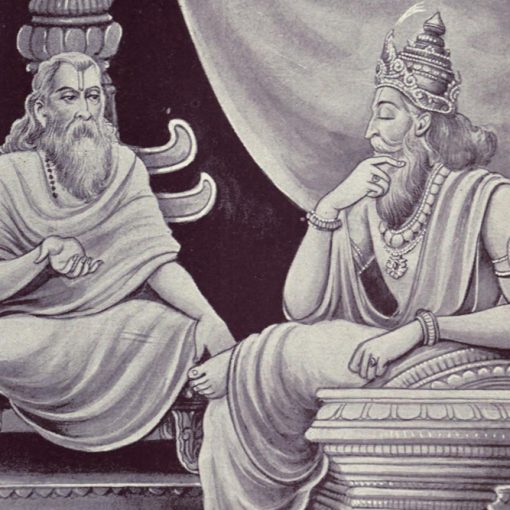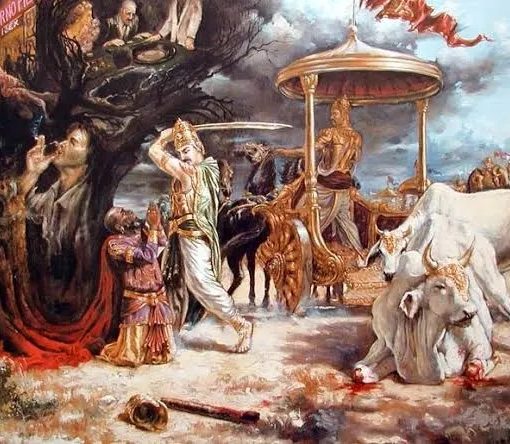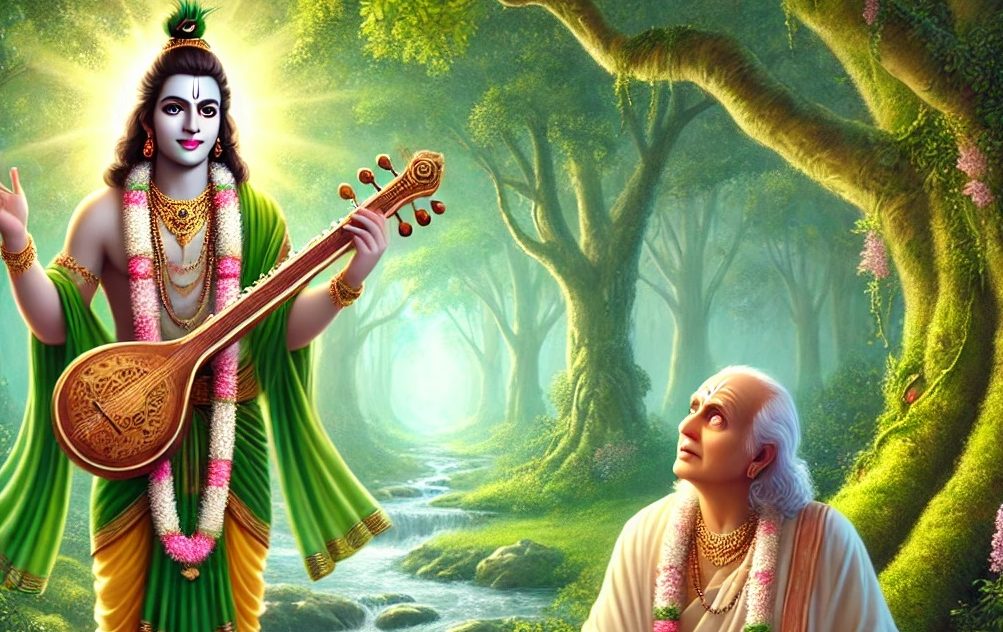Title: The Moral Dilemma: The Story of Arjuna, Aśvatthāmā, and Krishna’s Equivocal Guidance in Srimad Bhagavatam 1.7
Introduction
The seventh chapter of the Srimad Bhagavatam, titled “The Son of Droṇa Punished,” is a pivotal chapter filled with intense drama, moral dilemmas, and spiritual insights. This chapter offers a glimpse into the complexities of dharma (righteous duty), the power of devotion, and the nuanced guidance of Lord Krishna in times of ethical conflict. It details the aftermath of the Kurukshetra War, highlighting the internal and external battles faced by the Pandavas, especially Arjuna, in delivering justice to the treacherous act committed by Aśvatthāmā, the son of Droṇa.
In this blog, we will explore the essence of this chapter, delving into the philosophical and ethical challenges faced by the Pandavas, particularly focusing on Arjuna’s response to Lord Krishna’s guidance. We will also see how Lord Krishna’s instructions reveal deeper layers of dharma that go beyond mere legalistic interpretations.
1. Context: The Aftermath of the Kurukshetra War
The chapter begins with a discussion between Saunaka Rishi and Sūta Goswami. Saunaka inquires about the events that transpired after the departure of Nārada Muni, specifically how Vyāsadeva compiled the Bhagavatam under Nārada’s instructions. In response, Sūta Goswami begins narrating the story of Aśvatthāmā’s punishment.
In the aftermath of the Kurukshetra War, the battlefield is marked by death, destruction, and grief. The Pandavas emerge victorious, but their hearts are heavy with sorrow due to the immense loss of life, including the death of their beloved sons, the Upapandavas. Aśvatthāmā, driven by anger and vengeance, sneaks into the Pandava camp one night and murders the five sons of Draupadi while they are asleep. He commits this heinous act with the intent to please Duryodhana, the Kaurava prince. However, this gruesome act only leads to further condemnation, even from Duryodhana himself.
When Draupadi hears of her sons’ murder, she is devastated. Her heart is torn apart by grief, and her wailing echoes through the camp. Arjuna, who is overcome with rage and a sense of duty to his wife and slain children, vows to avenge the brutal killing. He sets off in pursuit of Aśvatthāmā, determined to bring him to justice.
2. Arjuna’s Pursuit and Capture of Aśvatthāmā
Arjuna, with Lord Krishna as his charioteer, chases Aśvatthāmā across the battlefield. Realizing that Arjuna is closing in on him, Aśvatthāmā, in a state of desperation, releases the brahmāstra, a powerful nuclear-like weapon, to save himself. The release of this deadly weapon threatens the lives of countless beings, as its fiery energy spreads across the three worlds. Recognizing the potential devastation, Arjuna turns to Krishna for guidance on how to counter this weapon.
Lord Krishna advises Arjuna to use another brahmāstra to neutralize the one released by Aśvatthāmā, as only a similar weapon can counteract its effects. Arjuna then invokes his own brahmāstra, leading to a dramatic clash of energies that engulfs the universe in flames. Observing the imminent danger to the entire creation, Arjuna, by Krishna’s desire, retracts both the brahmāstras, thus averting universal destruction.
Having neutralized the threat, Arjuna successfully captures Aśvatthāmā, binding him like an animal with ropes. The captured Aśvatthāmā, stripped of his dignity, is brought before Draupadi.
3. Draupadi’s Compassionate Plea
In a surprising turn of events, Draupadi, despite her overwhelming grief, is unable to tolerate the sight of Aśvatthāmā being bound like an animal. Despite her desire for justice, her natural compassion as a mother and woman prevails. Draupadi, being a devotee and soft-hearted by nature, remembers that Aśvatthāmā is the son of Droṇācārya, their revered teacher. She laments that just as she is mourning the death of her sons, Aśvatthāmā’s mother, Kṛpi, would also suffer the agony of losing her child.
Draupadi’s plea for mercy reveals the noble qualities of forgiveness and compassion, even toward the murderer of her own children. Her sense of duty toward maintaining the honor of the guru-parampara (disciplic succession) and her innate softness as a woman shine through, exemplifying the ideal of forgiveness in Vaishnavism.
4. Krishna’s Equivocal Guidance
Amid this moral conflict, Lord Krishna offers nuanced guidance that appears ambiguous at first. He instructs Arjuna not to kill Aśvatthāmā since he is the son of a brāhmaṇa, but simultaneously reminds him that Aśvatthāmā is an ātatāyī, an aggressor who deserves to be killed according to dharma.
This seeming contradiction is a deliberate test of Arjuna’s understanding of dharma and his sense of justice. Krishna, as the Supreme Teacher, often presents such dilemmas to highlight the subtleties of moral principles. His intent is to ensure that Arjuna fulfills his duties while maintaining his integrity as a devotee and warrior.
Arjuna, in this moment of perplexity, has to balance his promise to Draupadi, his duty as a kṣatriya, and his adherence to dharma. He realizes that by sparing Aśvatthāmā’s life but taking away the jewel from his forehead—symbolizing his prestige and power—he can fulfill both Krishna’s instructions and his promise to Draupadi.
5. The Symbolic Punishment of Aśvatthāmā
Arjuna’s decision to remove the jewel from Aśvatthāmā’s head, rather than killing him, is significant. The jewel symbolizes Aśvatthāmā’s strength, power, and divine protection. By removing it, Arjuna effectively humbles Aśvatthāmā, stripping him of his pride and rendering him powerless.
This act not only fulfills the promise made to Draupadi but also adheres to the dharmic principles that Krishna has outlined. It serves as a symbolic execution, sparing Aśvatthāmā’s life but subjecting him to a fate worse than death—living with the dishonor of his actions.
Aśvatthāmā, thus, is left humiliated, with his bodily luster diminished due to the infanticide and the loss of the jewel. He is driven out of the camp, defeated and disgraced, highlighting the ultimate consequence of adharmic actions.
6. The Teachings of Chapter 7: Balancing Dharma with Compassion
The story of Arjuna, Aśvatthāmā, and Draupadi in Chapter 7 of the Srimad Bhagavatam is a profound exploration of dharma in action. It illustrates the complexities of moral decision-making, where legalistic justice must be balanced with compassion and mercy. It emphasizes the following key lessons:
- The Multi-Dimensional Nature of Dharma: Dharma is not a one-dimensional concept. It requires careful consideration of circumstances, intentions, and the broader implications of actions. Krishna’s guidance exemplifies the need for a deeper understanding of dharma, which often transcends literal interpretations of scriptures.
- The Role of Compassion in Justice: Draupadi’s plea for Aśvatthāmā’s life showcases the principle that true justice should be tempered with compassion. Even in the face of personal loss, the ideal devotee maintains a compassionate heart.
- The Supreme Position of Krishna as the Guide: Throughout the episode, Krishna’s role as the supreme guide and teacher is evident. His instructions, though seemingly contradictory, are designed to elevate Arjuna’s consciousness and understanding of dharma. Krishna’s guidance is not just about adhering to rules but about cultivating a heart that is aligned with divine will.
- Humility as the Ultimate Punishment: The removal of Aśvatthāmā’s jewel symbolizes the stripping away of false pride. In the Vaishnava tradition, humility is considered a virtue, while pride is seen as a barrier to spiritual progress. Aśvatthāmā’s punishment, therefore, serves as a lesson in the consequences of unchecked ego and adharmic actions.
Conclusion
The chapter “The Son of Droṇa Punished” from the Srimad Bhagavatam is a rich narrative that delves into the depths of dharma, devotion, and divine guidance. It showcases the complexities of moral decisions faced by the Pandavas and highlights how Lord Krishna’s guidance helps them navigate these challenges.
The chapter serves as a timeless lesson in balancing justice with compassion, understanding dharma beyond literal interpretations, and following the guidance of the Supreme Lord, who always acts for the highest good. As we reflect on this chapter, we are reminded that true dharma is not just about rules but about aligning our hearts and actions with the will of the Supreme, guided by compassion and humility.





